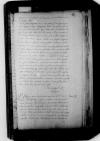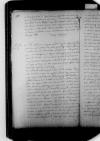List #424
Alfonso de VALDÉS do Ioannes DANTISCUSToledo, 1529-02-01
Regest polski: Valdes zawiadamia Dantyszka, że wszyscy jego przyjaciele mają się dobrze z wyjątkiem młodego Johannesa Obernburgera, który był bliski śmierci, ale wyzdrowiał. Na tę samą chorobę niektórzy zmarli, chory jest także Cortes i nie wiadomo jeszcze, czy przeżyje. Cesarz trwa przy swoich zamiarach [podróży do Italii]. Papież ciężko chorował i mówiło się już o wyborze następcy. Francuzom nie podoba się Rzym [jako siedziba papieża] z powodu bliskości armii cesarskiej. Valdes stawia siebie w pozycji pozbawionego realnych wpływów na wydarzenia widza theatrum mundi.
| odebrano Valladolid, [1529-02-08] Rękopiśmienne podstawy źródłowe:
Pomocnicze podstawy źródłowe:
Publikacje:
| ||||||||||||||||||||||||||
Tekst + aparat krytyczny + komentarzZwykły tekstTekst + komentarzTekst + aparat krytyczny
print 1 Clarissimo viro, Domino Ioanni Dantisco, serenissimi regis Poloniae oratori,
ms 1 2 omitted⌈Clarissimo viro, Domino
ms 1 2 omitted⌉
Salutem plurimam.
ms 1 2 Oberemburgem⌈Oberemburgensemprint 1 Oberemburgensem,
ms 1 2 Oberemburgem⌉
ms 1 2 morire,
ms 2 mori⌈morineprint 1 morine,
ms 1 2 morire,
ms 2 mori⌉
an vivere, ut nunc quidem res humanae reguntur.
ms 1 manus,
ms 2 munus⌈munusprint 1 munus,
ms 1 manus,
ms 2 munus⌉ a superis datum est, fabulae exitum exspectabimus.
Vale.
ms 1 1529,
ms 2 millesimo quingentesimo vigesimo nono⌈1529print 1 1529,
ms 1 1529,
ms 2 millesimo quingentesimo vigesimo nono⌉.
Tuus


 BK 222, No. 51, p. 194
BK 222, No. 51, p. 194